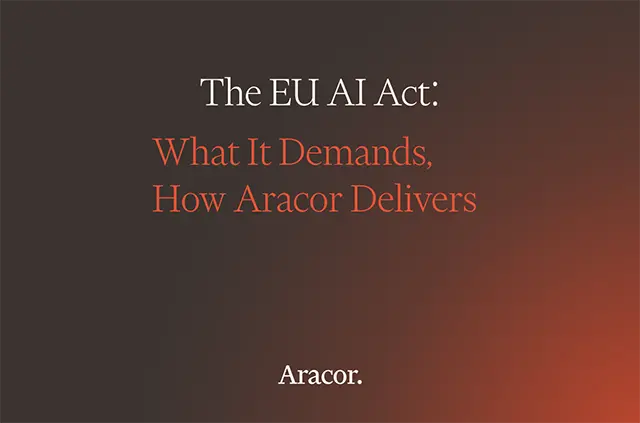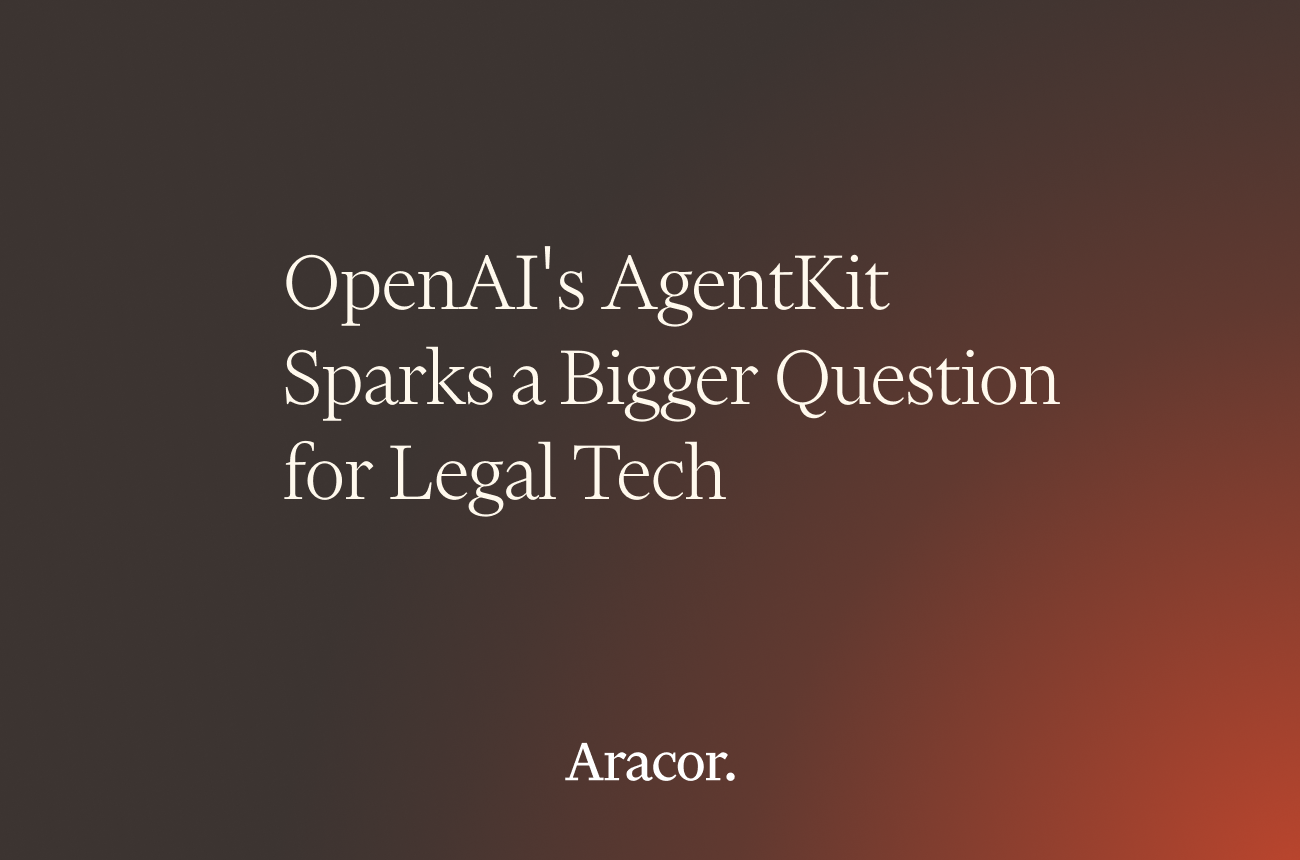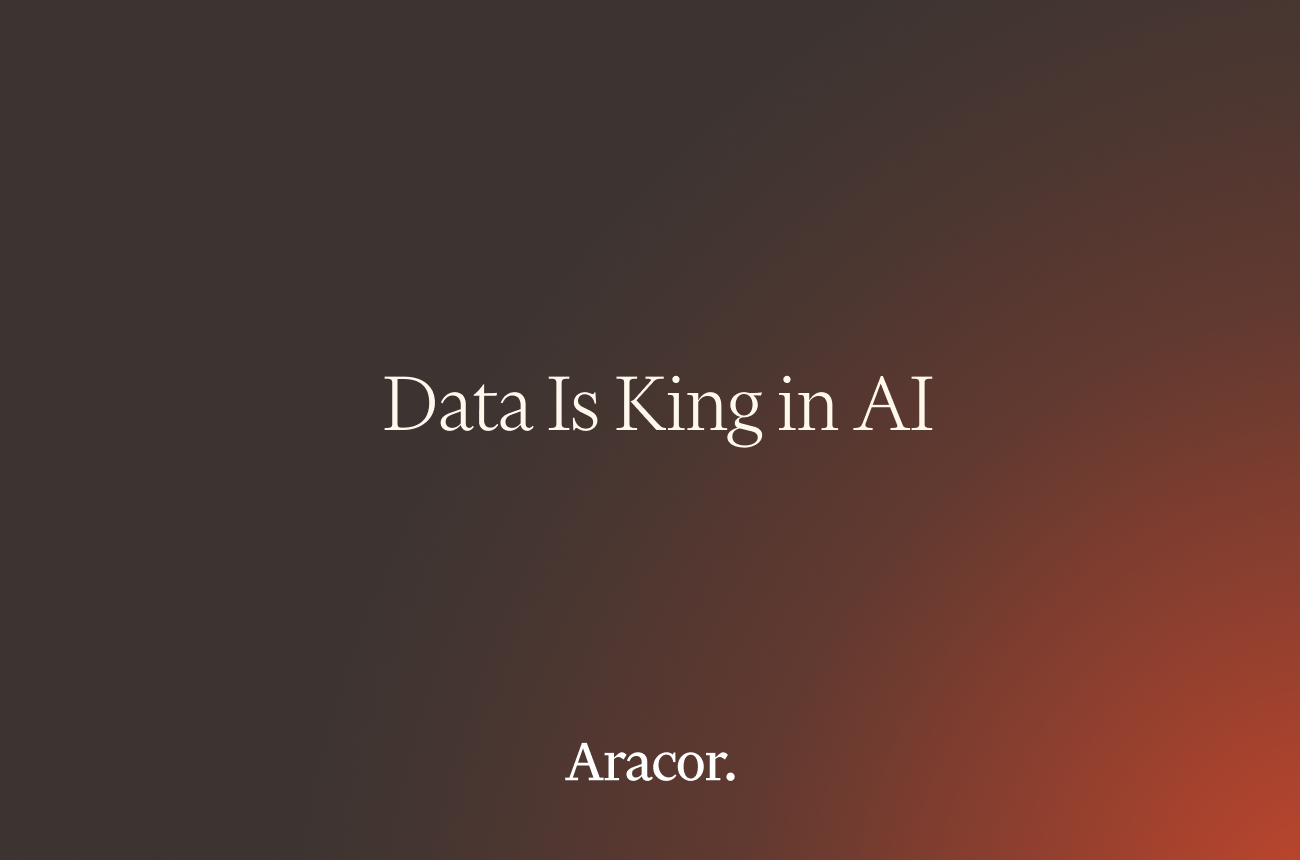



Aracor CEO and Co-Founder Katya Fisher joined Fritz Spencer on EisnerAmper’s TechTalk to discuss how Aracor is reshaping the future of M&A, investment, and due diligence.
Katya explains how the Aracor AI Dealmaking Platform brings order, speed, and clarity to complex transactions. She highlights how Aracor helps eliminate institutional amnesia so deal teams retain the intelligence behind every decision, clause, and negotiation.
The conversation also covers one of the most important topics in modern diligence: security and compliance in AI. Katya outlines how Aracor’s secure architecture, Zero Data Retention, and enterprise-grade controls provide the power of AI without compromising trust.
For professionals in M&A, private equity, venture, or corporate legal, this is a clear look at how technology is elevating the business of deals.
Dont miss it!
.webp)
.webp)

We’re pleased to share that Aracor has been recognized by the Legal Insider Awards 2025 in the category “Most Innovative AI-Native Dealmaking Platform – Miami 2025.”
This award is an important milestone for our team. We’ve been focused on building a tool that makes the deal process clearer and easier for lawyers, investors, and companies. Aracor helps teams review documents, prepare deal materials, and manage the full process from start to finish — all in one place.
We’re grateful to Legal Insider for this recognition, and to our customers and partners for their trust and feedback. It motivates us to keep improving the product.
Read the official announcement on Legal Insider


The Artificial Intelligence Act (Regulation (EU) 2024/1689) establishes a harmonized framework for the governance of artificial intelligence within the European Union. Adopted on 12 July 2025, the EU AI Act has become the foundation of every serious discussion on responsible AI.
What began as a legislative abstraction now defines how organizations must design, procure, and deploy intelligent systems.
The Act captured attention because it set out the what: which systems are prohibited, which are deemed high-risk, and which obligations apply to both providers and purchasers. That clarity mattered then; it matters still more now, as compliance reshapes contracts, procurement, and reputation across industries.
The greater challenge is the how. Knowing the rules is one thing; proving that systems are secure, transparent, and accountable is another.
It is in this respect that Aracor distinguishes itself.
Aracor has built compliance and security into the structure of its platform. Zero Data Retention (ZDR) ensures that no client information is retained beyond immediate use, removing one of the principal risks of AI workflows. Multifactor authentication prevents unauthorized access, while comprehensive audit records create a verified account of every action, ensuring transparency and traceability.
The company holds certification under ISO 27001 and SOC 2, providing independent assurance that its information-security and governance controls meet the highest international standards. GDPR compliance aligns operations with the world’s most rigorous privacy regime, while independent penetration testing places all systems under continual scrutiny, with any findings remediated on defined timetables.
At its foundation, Aracor operates within a closed private environment, employing secured language models so that sensitive legal and financial data remain entirely under client control.
In venture capital, private equity, and mergers and acquisitions, documents are not merely records; they constitute the transactions themselves. A single breach of security may delay negotiations, erode trust, and compromise value. Compliance, therefore, is not a procedural exercise but an expression of integrity and discipline.
The EU AI Act defines the what. Aracor delivers the how, enabling organizations to move quickly, remain compliant, and protect what matters most.


OpenAI's launch of AgentKit last week reignited debate across the AI industry about whether visual, node-based workflow builders represent the future of agent development or a pattern we should be moving beyond. In legal tech, where similar tools already exist, it raises a sharper question: is this really the interface lawyers need?
The familiar pattern
AgentKit’s Agent Builder uses a drag-and-drop interface with arrows and branching paths. It looks familiar to anyone who has used tools like Zapier or n8n. While OpenAI’s release targets developers, legal tech companies have been experimenting with comparable systems that let firms map processes visually, sometimes even through natural language.
The appeal is clear. Legal work is structured and repeatable, which makes it seem ideal for visual workflows. Yet we must ask whether this model truly serves lawyers.
The maintenance problem
Visual workflow tools often collapse under real-world complexity. The challenge lies not in the interface but in the engineering behind it: handling exceptions, managing state, fixing errors, and updating as needs evolve.
Even strong legal operations teams struggle here. There is a big difference between “this process can be mapped visually” and “lawyers should maintain these diagrams.” Making a workflow visual does not remove complexity; it shifts it to the person responsible for keeping it running.
Large firms can dedicate people to maintain such systems. Smaller teams cannot. For them, the workflow builder becomes a burden. Technically minded lawyers who enjoy automation exist, but they are rare. Designing for them risks leaving most lawyers behind.
What should we build instead?
Progress will not come from giving every lawyer a node editor. It will come from designing interfaces that mirror how lawyers actually work. Imagine checklist-style flows that focus on outcomes, where the system manages logic and routing automatically. No diagrams to decipher, no branching paths to debug.
At Aracor, we are building toward that model: agentic systems that manage the process, not just the document. Instead of asking lawyers to design or maintain workflows, Aracor’s platform continuously verifies deal documents, detects changes automatically, and updates analyses in real time. Intelligence lives inside the workflow, keeping diligence, negotiation, and compliance aligned across the deal cycle. It replaces static reviews with living processes, giving legal and deal teams clarity without added maintenance.
Lawyers still need transparency. They cannot operate inside black boxes. But transparency does not mean showing every wire and node. It means revealing what matters: what is happening, why it matters, and what effect it has.
The next wave
The future will not belong to visual builders but to systems that think and act within defined boundaries. Aracor’s agentic workflows already point there: executing deal processes end to end, monitoring updates, and maintaining analysis continuously. These agents focus on execution, not configuration, allowing lawyers to stay anchored in judgment while the system keeps every moving part in sync.


In artificial intelligence, data is not a byproduct of innovation. It is the source of it. Every model’s capacity to reason, predict, and decide depends on the quality and integrity of the information it learns from. Systems trained on synthetic or generalized text can simulate intelligence, but they cannot replicate judgment. True understanding emerges only when an AI is shaped by real-world complexity, the authentic records, negotiations, and outcomes that define human decision-making.
Aracor is built with this principle at its core. In alignment with the Constructor ecosystem, its architecture is designed to integrate verified, domain-specific data environments while maintaining the highest standards of security and compliance. Each analysis strengthens the next through a positive learning feedback loop, a continual process in which verified outcomes refine future performance. This design ensures that Aracor’s intelligence remains grounded, precise, and capable of accelerating improvement without compromising trust.
Where conventional models reach their limits, Aracor is built to keep learning. It transforms static information into living intelligence, recognizing nuance, anticipating risk, and strengthening with every verified outcome. In the future of AI, data remains not just the raw material of progress. It is its sovereign force.


I’ve reviewed thousands of pages of contracts over the years. I’ve run diligence across jurisdictions, industries, and deal types. But my #1 recommendation when evaluating a deal has nothing to do with legal structure.
Talk to them. Ask questions. Not just about the product or the numbers — but how they think, how they handle pressure, how they treat hard questions.
And then pay attention to one thing above all: Do they want you to understand their business — or do they just want you to write the check?
If a founder is cagey during diligence — even after you’ve signed an NDA and clearly signaled interest — that’s a problem. Transparency in diligence isn’t a favor. It’s a signal. If they’re not forthcoming now, when they need something from you, it only gets worse post-close.
I’ve seen more deals turn sideways because of lack of trust and communication than because of any technical issue. People reveal themselves early — if you’re paying attention.
But tools only matter if the humans involved are operating in good faith. Founders who want to build something real want you to see it clearly. If they don’t? That’s your answer.


I recently had lunch with an Aracor user, an investor who shared a story about how, with Aracor's help, she caught a critical mistake in an agreement before it was too late. Here’s what happened.
She was deep into final docs on a growth deal — term sheet signed, diligence mostly wrapped, everyone ready to move forward.
She mentioned that she isn't the type to personally sift through 80-page agreements late at night. But she's exactly the kind of investor who knows how to ask the right questions — and who can sense when something isn't quite right.
During a review call, she paused and asked the lawyers: “Just confirm — the board is still 2–1 in favor of the founder, right?”
A long pause. Some scrolling. Then: “Actually… not exactly.”
Somewhere between the term sheet and the final voting agreement, the math had subtly shifted. A revised definition here, a phrasing tweak there — and suddenly, the founder’s control had quietly been diluted.
Nobody else caught it — not because they weren't sharp, but because subtle changes easily slip through when juggling multiple documents, numerous edits, and the pressures of a fast-moving deal.
Her single, timely question preserved critical alignment. But it highlighted something important: Even great legal teams miss things. And most investors don’t know which questions to ask — until it’s too late.
Aracor automatically matches your term sheet against the final deal documents, clearly tracking what's changed and what's drifted from signing to signature. So founders, investors, and legal teams can stay focused on the big picture without losing sight of the details.
Because asking the right question is powerful. But having the right tools means you don’t have to rely on intuition alone to catch critical issues.


As an in-house lawyer, I don’t think my job is to gatekeep knowledge. My job is to empower the people I work with — to provide clarity, confidence, and the ability to make smart decisions without always needing to pick up the phone. For years, I did everything manually.
Then came the advent of generative AI.
Initially, I thought these tools would finally solve my problems. And don't get me wrong — I LOVE ChatGPT. But for contract and deal work, it just wasn't enough. First, I couldn’t see and directly reference my documents side-by-side, which is critical for my workflow. Second, LLMs couldn't understand what I specifically value or read documents the way I do. They go broad but lack the deep vertical expertise I need.
That's why I built Aracor and why we now use it across the Constructor Group ecosystem.
My legal team has transformed significantly:
We view Aracor as a critical intermediary step — a trusted second opinion to guide our decision-making. Because of this, we've stopped depending on external counsel for routine document review, saving substantial money, and more importantly, significant amounts of time. Internally, we’ve grown smarter, faster, and more confident.
Now, we're expanding Aracor to top business executives within the Constructor Group ecosystem, enabling them to quickly access critical information related to their projects. This alignment is essential for Constructor Capital as a venture fund, where legal and business decisions are closely intertwined.
We don’t just upload contracts and forget about them — we actively structure our deal knowledge. I preload Aracor with critical documents, highlight essential rights, mark potential risks, and annotate the exact things I anticipate our team needing months later.
When finance asks about a distribution waterfall, they don't have to wait for me. When our CEO needs to confirm board control post-close, it's one click away. When our investor queries a veto right, it's already flagged clearly.
I'm still deeply involved in guiding strategy, but I've stopped being the bottleneck.
Here's the magic: the more I put into Aracor, the more valuable my work becomes — not just for the deal, but for the entire business.
Imagine you're a law firm partner advising family offices, funds, founders, or corporate clients. What if you could deliver the same empowerment and visibility to your clients?
You don't need to build software to scale your value; you just need to own its delivery. This is how legal teams become indispensable — not by hoarding knowledge, but by making it actionable and accessible.
If your clients live in their deals long after signing, this is your path to staying essential.


Just because a deal closes doesn’t mean a happy ending is in store. Some deals unravel months — or even years — later.
I’ve seen it happen with partnerships that looked perfect on paper, only to reveal fundamental misalignment once the real work began. I’ve seen investments that seemed strategic at the time but became expensive distractions. Sometimes it wasn’t anyone’s fault — priorities changed, markets moved, people evolved.
And sometimes (most times!), the red flags were there from the beginning — we just didn’t want to see them.
These experiences are painful, but they’ve taught me some of the most valuable lessons in my career. The deals that hold up over time aren’t just the ones with clean terms or airtight contracts. They’re the ones built on clarity, alignment, and a shared understanding of how things will work when circumstances inevitably change.
The hard part isn’t closing a deal. It’s maintaining one. That means staying ahead of shifting control rights, understanding what’s buried in old side letters, or knowing when your waterfall math quietly stopped reflecting reality.
Not just to help you close — but to help you manage the deals you already have. Aracor maps control, rights, obligations, risks — across time, across entities, across relationships. Because the real test of a deal isn’t day one. It’s day 1,000.
If you’ve had a deal unravel after the fact — what did you learn from it? What would you build differently next time?